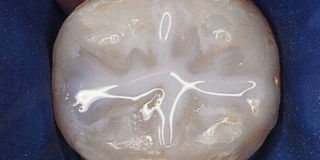Dental sealants are good for you

A molar tooth covered in a sealant. Using a sealant protects against decay and damage. file photo
A dental sealant is a material that essentially covers the grooves or pits and fissures of teeth. Protecting the pits and fissures reduces the chance of a person developing tooth decay on the top of their teeth. Usually, it is the back teeth such as the molars and premolars that develop grooves and therefore, require this kind of treatment.
However, because the front teeth (incisors and canines) have shallow pits and fissures, this type of preventive treatment may not be necessary.
Pits and fissures are often very difficult to clean because the bristles on the toothbrush are not able to get to the deep end of the grooves. And yet if they are not properly cleaned, decay will start to develop on the top of the tooth, which may in the long run require filling.
Pits and fissures on the surface of the tooth are also ideal grounds for harbouring plaque, which contain bacteria that can cause tooth damage.
Who can get fissure sealants?
•Children with decay and fillings in their baby teeth.
•People with deep pits and fissures, who experience difficulty in cleaning their teeth.
•Individuals who are at high risk of developing tooth decay.
•People with poor oral hygiene.
Why are sealants used?
Pit and fissure sealants are designed to specifically offer preventive effects. These sealants occupy the pits and fissures of teeth with a resin material and as they get filled up, the bacteria are not able to go deep into the grooves, and this causes less bad bacteria to be present on the tooth.
Subsequently, teeth with fissure sealants are often times less likely to develop decay than those that have not been filled. They also make it easy to clean the teeth during brushing, as food particles do not get trapped easily in the teeth because of the sealant.
Are fissure sealants effective?
Fissure sealants are good in reducing the chances of a person developing teeth decay in the long run. They are also effective in preventing or stopping progression of tooth decay if applied in the right way.
However, it is important to know that these sealants can fail especially if the material used is not appropriate or if the person carrying out the procedure is not experienced.
The writer is a dentist




